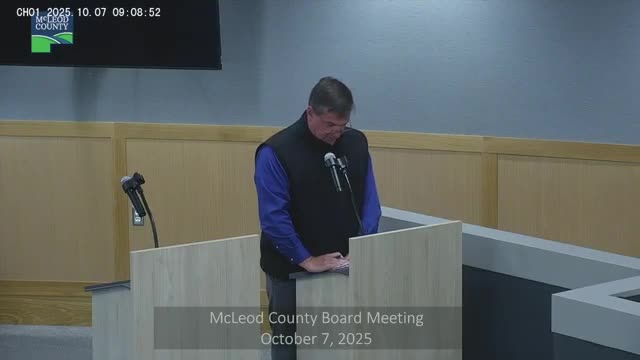County approves accessory building permit and grants cannabis cultivation conditional use permit with conditions; cannabis vote 4–1
October 10, 2025 | McLeod County, Minnesota
This article was created by AI summarizing key points discussed. AI makes mistakes, so for full details and context, please refer to the video of the full meeting. Please report any errors so we can fix them. Report an error »

The McLeod County Board approved two land‑use conditional use permits after planning‑staff presentations and public discussion: a permit for an accessory building larger than 2,400 square feet and a permit for indoor cannabis cultivation on a rural agricultural parcel.
Environmental Services staff described Conditional Use Permit 25‑19 for Donald Artman to construct a 52×64 (3,328‑square‑foot) accessory building on a 5.09‑acre platted lot zoned R‑1 (Artman Acres, Lot 1, Block 1) in Winsted Township. The Winsted Township Board and the County Planning Commission recommended approval; the board approved the permit by voice vote.
The board then considered Conditional Use Permit 25‑20 requested by Greer Montgomery for indoor cannabis cultivation in an existing accessory building (48×140) on a 10.37‑acre parcel in Helen Township. Planning Commission and Helen Township recommended approval with conditions. The board reviewed six conditions recommended by the planning commission: (1) no on‑site processing, manufacturing, or retail sales; (2) a new CUP required if more than five non‑resident employees work on‑site; (3) operations and odors shall not be readily detectable beyond the property line; (4) wastewater from indoor cultivation must be captured in an on‑site holding tank and disposed of at a licensed wastewater facility (no on‑site disposal); (5) compliance with Minnesota Office of Cannabis Management rule 98‑10 and all appendages pursuant to Minnesota statute 342 as referenced in the packet; and (6) the applicant must notify McLeod County Environmental Services if the operation ceases.
The applicant, Greer Montgomery, and partner Jeremy Erickson addressed the board, stating they had applied to the state and would follow Office of Cannabis Management rules, use air scrubbing and other odor control, and have transport of harvested material by licensed state vehicles to off‑site processors. County Attorney staff and environmental staff noted the board could require additional review if the operation expanded beyond the stated employee threshold or violated conditions.
After discussion, Commissioner Schmalz voted no and the remaining four commissioners voted yes; the motion passed 4–1. Several commissioners urged close compliance monitoring and noted that any significant expansion or violation of the conditions would prompt county review and could require a new CUP.
Environmental Services staff described Conditional Use Permit 25‑19 for Donald Artman to construct a 52×64 (3,328‑square‑foot) accessory building on a 5.09‑acre platted lot zoned R‑1 (Artman Acres, Lot 1, Block 1) in Winsted Township. The Winsted Township Board and the County Planning Commission recommended approval; the board approved the permit by voice vote.
The board then considered Conditional Use Permit 25‑20 requested by Greer Montgomery for indoor cannabis cultivation in an existing accessory building (48×140) on a 10.37‑acre parcel in Helen Township. Planning Commission and Helen Township recommended approval with conditions. The board reviewed six conditions recommended by the planning commission: (1) no on‑site processing, manufacturing, or retail sales; (2) a new CUP required if more than five non‑resident employees work on‑site; (3) operations and odors shall not be readily detectable beyond the property line; (4) wastewater from indoor cultivation must be captured in an on‑site holding tank and disposed of at a licensed wastewater facility (no on‑site disposal); (5) compliance with Minnesota Office of Cannabis Management rule 98‑10 and all appendages pursuant to Minnesota statute 342 as referenced in the packet; and (6) the applicant must notify McLeod County Environmental Services if the operation ceases.
The applicant, Greer Montgomery, and partner Jeremy Erickson addressed the board, stating they had applied to the state and would follow Office of Cannabis Management rules, use air scrubbing and other odor control, and have transport of harvested material by licensed state vehicles to off‑site processors. County Attorney staff and environmental staff noted the board could require additional review if the operation expanded beyond the stated employee threshold or violated conditions.
After discussion, Commissioner Schmalz voted no and the remaining four commissioners voted yes; the motion passed 4–1. Several commissioners urged close compliance monitoring and noted that any significant expansion or violation of the conditions would prompt county review and could require a new CUP.
View full meeting
This article is based on a recent meeting—watch the full video and explore the complete transcript for deeper insights into the discussion.
View full meeting
